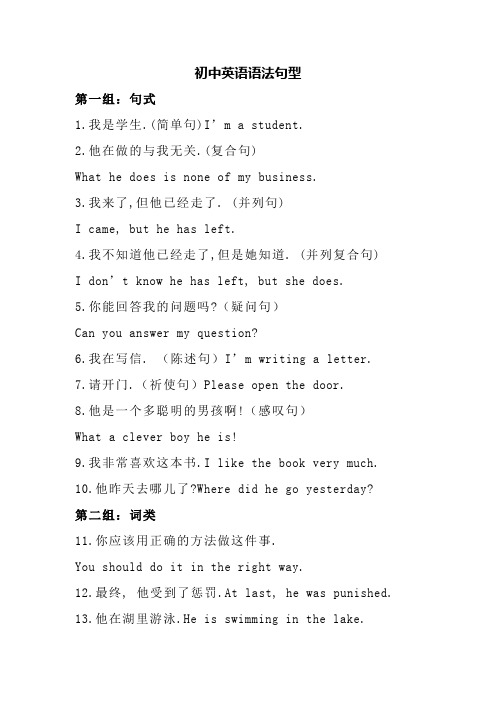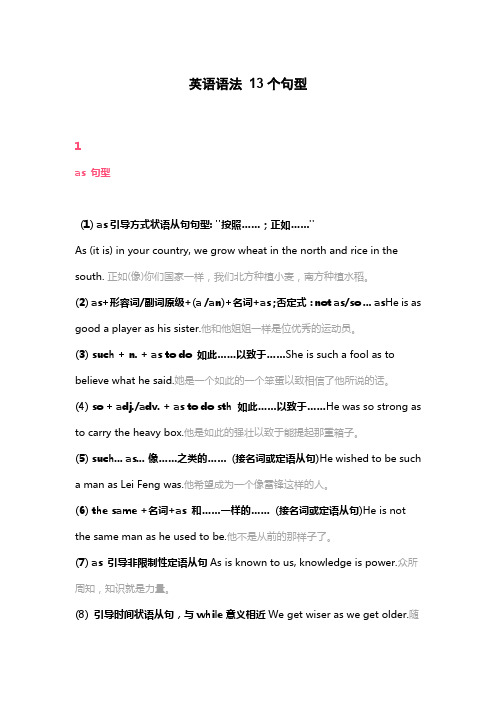语法句型篇
初中英语语法句型

初中英语语法句型第一组:句式1.我是学生.(简单句)I’m a student.2.他在做的与我无关.(复合句)What he does is none of my business.3.我来了,但他已经走了. (并列句)I came, but he has left.4.我不知道他已经走了,但是她知道. (并列复合句)I don’t know he has left, but she does.5.你能回答我的问题吗?(疑问句)Can you answer my question?6.我在写信. (陈述句)I’m writing a letter.7.请开门.(祈使句)Please open the door.8.他是一个多聪明的男孩啊!(感叹句)What a clever boy he is!9.我非常喜欢这本书.I like the book very much.10.他昨天去哪儿了?Where did he go yesterday?第二组:词类11.你应该用正确的方法做这件事.You should do it in the right way.12.最终, 他受到了惩罚.At last, he was punished.13.他在湖里游泳.He is swimming in the lake.14.至今,我已经读了100部小说.So far, I have read 100 novels.15.我不喜欢这乐曲.I don’t like the music.16.你喜欢音乐吗?Do you like music?17.如果我是你, 我会跟他在一起.If I were you, I would stay with him.18.面对困难,一定要保持冷静.When facing difficulty, you should keep calm.19.最终,他梦想成真.At last, his dream came true.20.你所说的听起来很有道理.What you says sounds reasonable.第三组:词类21.我无法容忍你那样对母亲说话.I can’t have you speaking to mum that way.22.我看见他上学去了.I saw him going to school.23.他的演讲大大鼓舞了我们.His speech encouraged us greatly.24.使我们惊奇的是你不愿来.What surprised us was that you were unwilling to come.25.军人的天职是执行命令.It is a soldier’s duty to carry out orders.26.摇头意味着不同意. (v-ing作主语)Shaking heads means disagreement.27.将有一个更大的地震袭击这个国家.Another big earthquake will hit this country.28.我同意你所说的.(名词从句作宾语)I agreed with what you said.29. 我后悔告诉了你那件事.(双宾)I regret telling you that.30. 事实是他不相信我们. (名词从句作表语)The fact is that he doesn’t believe us.第四组:句子成分31. 楼上的那家人很外向.(adv 作定语)The family upstairs are outgoing.32. 我认识一个加TOM 的男孩 (过去分词作定语)I know a boy named Tom.33. 在有问题的地方做记号.(从句作状语)Make marks where you have questions.34. 我发现他仰卧在地上(v-ing 作宾补)I found him lying on his back on the ground.35. 他敞着窗睡觉, 醒着. ( adj.作状语)He slept with the window open, awake.36. 我发现他不在家. (adv.作宾补)I found him out.37. 这就是我过去工作过的那家工厂.This is the factory where I used to work.38. 他是一个学生, 一个受学生们欢迎的学生.(同位语—代词)He is a student, one who is popular with the students.39. 我的工作是教英语.(V-ing作表语)My job is teaching English.40. 我去看他却发现他不在家.(不定式作结果状语)I went to see him only to find him out.第五组:句子结构41. 他进来了. (主---谓)He came in.42. 我喜欢英语. (主---谓---宾)I like English.43. 他解决了这道难题.He worked out the difficult problem.44. 我给了他一本书.I gave him a book.45. 我把这些钱借给了他.I lent the money to him.46. 我们选他当班长.We made him our monitor.47. 什么让你那样想?What makes you think that way?48. 我们抓住他偷窃.We caught him stealing.49. 你穿这件外套很好看.You look nice in this coat.50. 这菜味道不错.The dish tastes great.第六组:冠词51. 这只马是动物.The horse is an animal.52. 一只马是动物.A horse is an animal.53. 马都是动物.Horses are animals.54. 我喜欢音乐.I like music.55. 我喜欢这曲音乐.I like the music.56. 请开门.Please open the door.57. 在这里演讲是一种荣幸.It’s an honor to give a speech here.58. 他历史知识丰富.He had a good knowledge of history.59. 在夏天跳进河里游泳是多么有趣啊!What fun it is to jump into the river and swim in summer.60. 汽车正以60公里的速度行使.The car is going at a speed of 60 kilometers an hour. 第七组:名词61. 他做了个竹窗帘. (名词作定语)He made a bamboo curtain.62. 我从学校走回家要10 分钟. (名词所有格)It’s ten minutes’ walk for me to come home from school.63. 这一次他真的犯了错. (固定)He really made a mistake this time.64. 他给我们提供了一些信息.He offered us some information.65. 同学们正在纠正试卷.The students are correcting the papers.66. 是中国最先造纸的.It is China that first made paper.67. 我将去拜访Smith 的家人.I will call on the Smiths.68. 我将去Smith家看看.I will call at the Smith’s.69. 这地图对你很有价值.The map is of great value to you.70. 他英语知识丰富.He has a good knowledge of English.第八组:代词71. 让我们讲清楚, 迟到的人是要受罚的.Let’s make it clear that the one who is late should be punished.72. 是在我工作的那家工厂我遇上他的. (强调)It was in the factory where I worked that I met him. 73. 请大声说, 以便别人能听清楚你.Please speak aloud so that you can make yourself heard.74. 中国人口比日本多.The population of China is much larger than that of Japan.75. 一个石头房子比木头房子坚固.A house of stone is much stronger than one of wood.76. 我们每一个人都应该听老师的话.Every one of us should listen to the teacher.77. 在路大两旁有许多树.There are many trees on both sides of the road. 78. 许多工厂在污水排出之前几乎没有采取措施.Little has been done before polluted water goes into the river from many factories.79. 我有两个妹妹, 一个是老师,而另一个是护士.I have two sisters. One is a teacher while the other is a nurse.80. 她听到一声巨响,这使她震惊不以.She heard a loud noise, which made her frightened. 第九组:形容词,副词81. 我在街上偶然遇到了一个三岁的小孩. (复合adj.)I came across a three-year-old child on the street.82. 这老人独居却不孤独.The old man lives alone but he is not lonely.83. 他进来了, 看起来精神抖擞. (系表)He came in, looking energetic.84. 费了很大力, 他推开了门.He pushed the door open with great strength.85. 他下到深深的井里救我,这使我深为感动.He went deep into the well to save me, which moved me deeply.86. 你这样做太蠢了.It’s so foolish of you to do so.87. 对于我们学英语是必要的.It’s necessary for us to learn English.88. 这个包背起来太重.The bag is too heavy to carry.89. 这个剧院大得可以容纳1000人.The theatre is big enough to seat 1000.90. 他匆匆赶回家,内心充满恐惧.He hurried home, full of fear.第十组:比较级句式91. 这个题太难,我解不出(too … to ).The problem is too difficult for me to work out. 92. 他是这们一位好老师,以致我们都喜欢他(so that ). So good a teacher is he that all of us like him. 93. 在他俩中, Tom 较高.Of the two, Tom is the taller.94. 莎士比亚比任何一个英国其他作家更有名. Shakespeare is more famous than any other writer in the UK.95. 这间房是那间三倍大( as … as ).This house is three times as big as that one.96. 这间房比那间大三倍( than ).This house is three times bigger than that one. 97. 这间房比那间大三倍( the size of )This house is three times the size of that one . 98. 冬眠不只是睡觉( more than ).Hibernation is more than sleep.99. 你跑得不如他快.(not … more than)You are not faster than him.100. 你和他都跑得不快(no … more than)You are no faster than him.第十一组:数词101. 今天他是第十三个到校的(序数词).He was the 13th to come to school today.102. 请把作业送到302房间.Please send the housework to room 302.103. 他毕业于1987年7月7日.He graduated on July 7th in 1989.104. 除了英语和日语,他又学了一门语言,法语.Besides English and Japanese he has learned a third language – French.105. 成千上万的人在地震后无家可归.Thousands of people became homeless after the earthquake.106. 据说他在20世纪晚期在美国读过书.It’s said that he studied in America in the late 20th century.107. 经理将于一.两天后回来.The manager will be back in one or two days.108. 你完成了那篇2000词的文章吧?(复合adj)Have you finished the 2000 – word article?109. 我想买那些黑色鞋中的一双.I want to buy one pair of those black shoes.110. 他50岁时去了北京.He went to Bejing in his fifties.第十二组:主谓一致111. 这些都是目前最畅销的书.(从句主谓一致).These are the books that sell well at present. 112. 中国人口众多,其中80%是农民..China has a large population, of which 80% are peasants.113. 不仅我而且他去过北京。
新编现代汉语语法学句子篇单句句型与句式之主谓句

主谓谓语句中的主语和谓语之间通常存在修饰、限定等关系,如“他的 行为很让人失望”、“这本书的内容很丰富”。
03
主谓句的语义关系
陈述关系
陈述关系指的是主谓句所表达的内容是对某一事实或情况的 陈述,主语通常是陈述的对象,谓语则是对该对象进行陈述 或描述。例如:“北京是中国的首都。”这个主谓句陈述了 北京作为中国首都的事实。
例如:“你今天有空 吗?”、“你喜欢看 什么电影?”
疑问句的语调会有明 显的上升或下降,以 引起听者的注意。
感叹语气
感叹语气用于表达强烈的情感、感慨或 赞叹,通常以感叹号结尾。
感叹句的语调会有明显的下降,以强调 例如:“今天的天气太好了!”、“这
情感或感慨的强烈程度。
个电影太棒了!”
THANKS
根据主语和谓语的逻辑关系, 主谓句可以分为陈述句、疑问 句、祈使句和感叹句。
02
主谓句的类型
动词谓语句
动词谓语句是指以动词作为谓语的句子,是现代汉语中最常见的句型之一。
动词谓语句通常表达动作、行为、状态等意义,如“他走了”、“这本书很好看” 。
动词谓语句中的动词可以是及物动词,也可以是不及物动词,还可以是助动词和趋 向动词等。
陈述关系的特点是主语和谓语之间存在直接的关联,谓语是 对主语的描述或说明,而不是对主语的行动或状态产生影响 。
施事-受事关系
施事-受事关系是指主谓句中的主语和谓语分别表示动作的施事和受事,即主语是动作的发起者,谓语则描述了主语所施加的 行动对受事产生的影响或结果。例如:“他打开了门。”这个主谓句中,“他”是施事,“门”是受事,表示“他”实施了 “打开”这个动作,并且这个动作对“门”产生了“打开”的结果。
语法篇专题特殊句式强调倒装省略therebe

—I reminded you not to forget the appointment.
—So you did. (5)if引导的虚拟条件句含有were, had,should时, 可省略if, 再把 were, should或had移到从句句首。
Had you come earlier, you would have met him. (6)用于某些表示祝愿的句子里。
May you succeed! 【考点二】完全倒装
全部倒装即完全倒装有以下几种情况: (1)There be结构。另外,在此结构中可以用来代替be动词的动词 有:exist, seem, happen, appear, live, rise, stand等。
There exist different opinions on this question.
类型
例句
用助动词“do/does He does know the place well. /did+动词原形 Do write to me when you get there. ”来强调谓语动词 。
用形容词 very, The last thing she needed was more work.
注意:①当陈述部分既有肯定又有否定或者谓语动词既有实义动 词又有助动词时,可用下面两个句型:It is the same with...或So it is with...。
英语语法知识点整理优秀5篇

英语语法知识点整理优秀5篇英语语法五大基本句型篇一一、句型1——主语+谓语我们知道,一个句子是为了说明一件事(或表达一种感情),最简单的表达方式,就是“谁,怎么样了”。
这里的“谁”,就是句子的主语,它的内涵很丰富,可以是人、物、某种行为等。
“怎么样了”,就是句子的谓语,由动词充当。
主语+谓语,即构成一个最简单的句子。
举一些简单的例子:I dance.She died.we agree.……二、句型2——主语+谓语+宾语句型2在句型1的基础上多了一个宾语,宾语是什么呢?还是从句子表达事情的角度看,可以理解为“谁,对谁怎么样了”。
宾语,就是主语借助一个动作(谓语)作用的一个对象。
还是举一些简单的例子:I hate him.I love you.I dance with her.(注意,为什么这里多了一个with,学过动词那一节的同学肯定知道哦~)……三、句型3——主语+谓语+间接宾语+直接宾语在这个句型里,我们发现谓语后面跟了两个宾语,直接宾语,就是谓语动词直接作用的对象,而间接宾语,是指谓语需要先借助于一个间接的对象,再把动作传递到直接宾语身上。
如,I give him a book.(“给”,这个动作,最终作用的。
对象是“书”,但需要先通过“他”,把“给”这个动作传递到书)注意,如果理解不了这种句型,关系并不大,只有很少一些动词需要通过接两个宾语的方式来表达完整的意思,记住这些动词就行了。
四、句型4——主语+谓语+宾语+宾语补足语相对于句型2,这种句型中又多了一个宾语补足语,“补足”意思就是补充说明,所以宾语补足语的作用,就是用来补充说明宾语怎么样了。
I want you to go with me.(我要你,要你干什么呢?to go with me,即要你跟我一些走,这个部分就是宾语补足语。
)注意,在这种句型中,补足语可能不是一个具体的单词。
五、句型5——主语+系动词+表语还记得系动词吗?我们在动词那一节也讲过哦,这里就不复习了。
关于英语句子时态语法

关于英语句子时态语法【篇一】关于英语句子时态语法英语八种时态基本句型一、一般现在时1、肯定句:主语+动词原形(-s,-es)+ 其他。
2、否定句:主语+don’t/doesn’t+动词原形+其他。
3、一般句:Do/Does+主语+动词原形+其他?二、一般过去时1、肯定句:主语+动词-ed+其他。
2、否定句:主语+didn’t+动词原形+其他。
3、一般句:Did+主语+动词原形+其他?三、现在实行时1、肯定句:主语+am/is/are+动词-ing +其他。
2、否定句主语+am/is/are+not+动词-ing+其他。
3、一般句:Am/Is/Are+动词-ing+其他?四、过去实行时1、肯定句:主语+was/were+动词-ing+其他。
2、否定句:主语+was/were+not+动词-ing+其他3、一般句:Was/Were+主语+动词-ing+其他?五、一般将来时1、肯定句:主语+will/shall+动词原形+其他.2、否定句:主语+won’t/shan’t+动词原形+其他.3、一般句:Was/Shall+主语+动词原形+其他?六、过去将来时1、肯定句:主语+would/should+动词原形+其他。
2、否定句:主语+wouldn’t/shouldn’t+动词原形+其他。
3、一般句:Would+主语+动词原形+其他?七、现在完成时1、主语+have/has+过去分词+其他。
2、主语+haven’t/hasn’t+过去分词+其他。
3、 Have/Has+主语+过去分词+其他?八、过去完成时1、肯定句:主语+had+过去分词+其他。
2、否定句:主语+hadn’t+过去分词+其他。
3、一般句:Had+主语+过去分词+其他?【篇二】关于英语句子时态语法1. 一般现在时用法:A) 表示现在发生的动作、情况、状态和特征。
B) 习惯用语。
C) 经常性、习惯性动作。
例:He always helps others. (他总是协助别人。
现代汉语-语法(句型)

现代汉语-语法(句型)现代汉语,语法(句型)一、句型的定义和概况(一)什么是句型,根据结构关系对句子划分出来的类型是句子类型简称句型。
任何一种语言中的句子的数目都是无限的,但是句子的类型却是有限的。
句型是从众多的具体句子中抽象出来的结构模式。
句型是语法研究和句子理解的重要内容。
语法研究的主要任务之一是研究句子构造和运用的规律,建立句型系统。
句子理解、句法分析,对词、短语等语法单位以及句子成分的分析,关键之一也是为了确定句子的类型。
(二)汉语句型概况按照结构关系,可以把现代汉语的单句分为主谓句和非主谓句两大类型。
同时含有主语和谓语的句子叫做主谓句,分不出主语和谓语的句子叫做非主谓句。
、根据谓语的性质可以把主谓句分为: 1名词谓语句动词谓语句形容词谓语句主谓谓语句还可以根据主语的性质,把主谓句分为:名词主语句(主语由名词性词语充当的主谓句)谓词主语句(主语由谓词性词语充当的主谓句)主谓主语句(主语由主谓短语充当的主谓句)2、根据构成非主谓句的词语属性,可以把非主谓句分为:动词性非主谓句形容词性非主谓句名词性非主谓句叹词句汉语单句结构类型简表名词谓语句今天星期天。
“把”字句你去把垃圾倒了。
动“被”字句树叶被风吹跑了。
主词连谓句父亲听了后很高兴。
谓谓兼语句老师鼓励大家学好外语。
语双宾句管理员递给我两本新书。
句句存现句门口停着一辆小汽车。
形容词谓语句果园的苹果熟了。
主谓谓语句她眼睛熬得通红。
名词性非主谓句谁, 非动词性非主谓句下雨了。
主谓形容词性非主谓句真不错~句叹词句哎哟~1二、主谓句主谓句是能够划分成主语和谓语两个直接成分的句子。
主谓句是汉语句子中最常见的句型。
主谓句包括:(一)名词谓语句名词谓语句简称“名谓句”,是由名词或名词性短语充当谓语的句子。
现代汉语中名词性词语单独作谓语的情况比较少见,主要用于口语中的肯定句,常用来说明天气、时间、节日、节气、姓名、年龄、籍贯、职称、方位、处所、容貌、性状意义。
英语语法 13个句型

英语语法13个句型1as 句型(1) as引导方式状语从句句型: "按照……;正如……"As (it is) in your country, we grow wheat in the north and rice in the south. 正如(像)你们国家一样,我们北方种植小麦,南方种植水稻。
(2) as+形容词/副词原级+(a /an)+名词+as ;否定式:not as/so ... as He is as good a player as his sister.他和他姐姐一样是位优秀的运动员。
(3) such + n. + as to do 如此……以致于……She is such a fool as to believe what he said.她是一个如此的一个笨蛋以致相信了他所说的话。
(4) so + adj./adv. + as to do sth 如此……以致于……He was so strong as to carry the heavy box.他是如此的强壮以致于能提起那重箱子。
(5) such... as... 像……之类的……(接名词或定语从句)He wished to be sucha man as Lei Feng was.他希望成为一个像雷锋这样的人。
(6) the same +名词+as 和……一样的……(接名词或定语从句)He is not the same man as he used to be.他不是从前的那样子了。
(7) as 引导非限制性定语从句As is known to us, knowledge is power.众所周知,知识就是力量。
(8) 引导时间状语从句,与while意义相近We get wiser as we get older.随着我们长大,我们也变得越来越聪明。
(9) 引导原因状语从句,与because的用法相近As it was getting very late, we soon turned back.因为越来越迟了,所以我们不久就回来了。
英语最基础的语法有哪些整理

英语最基础的语法有哪些整理英语最基础的语法有哪些英语语法要懂得分类学,英语语法不能简洁的靠翻译句子去理解,直译是中式英语思维,学英语就要学会意译,所以语法跟汉语还是有所差异的,汉语后重心,英语前重心,这个大家要理解好。
下面是我为大家整理的英语最基础的语法,盼望对您有所关心!英语最基础的语法从时态来说:一般现在时,一般过去时,一般将来时,正在进行时从词性来说:名词,代词,形容词,动词,冠词一般现在时:主语+动词s+其它一般过去时:主语+动词的过去式+其它一般将来时:主语+will+动词+其它正在进行时:主语+be动词+动词ing+其他名词:Nouns (n.) 表示人或事物的名称box, pen,tree,apple代词:Pronouns (pron.)代替名词、数词、形容词We, this, them,myself形容词:Adjectives(adj.) 用来修饰名词,表示人或事物的特征good, sad, high, short动词:V erb (v.) 表示动作或状态Jump,sing,visit冠词:Articles (art.) 用在名词前,关心说明名词所指的范围a, an, the英语中的基本语法句型句型1:Subject (主语) + Verb (谓语)这种句型中的动词大多是不及物动词,所谓不及物动词,就是这种动词后不行以直接接宾语。
常见的动词如:work, sing, swim, fish, jump, arrive, come, die, disappear, cry, happen等。
句型2:Subject (主语) + Link. V(系动词) + Predicate(表语)这种句型主要用来表示主语的特点、身份等。
其系动词一般可分为下列两类:(1)表示状态。
这样的词有:be, look, seem, smell, taste, sound, keep 等。
(2)表示变化。
这类系动词有:become, turn, get, grow, go等。
- 1、下载文档前请自行甄别文档内容的完整性,平台不提供额外的编辑、内容补充、找答案等附加服务。
- 2、"仅部分预览"的文档,不可在线预览部分如存在完整性等问题,可反馈申请退款(可完整预览的文档不适用该条件!)。
- 3、如文档侵犯您的权益,请联系客服反馈,我们会尽快为您处理(人工客服工作时间:9:00-18:30)。
语法句型篇:
一、~~~ the + ~ est + 名词+ (that) + 主词+ have ever + seen ( known/heard/had/read, etc)
~~~ the most + 形容词+ 名词+ (that) + 主词+ have ever + seen ( known/heard/had/read, etc)
例句:Helen is the most beautiful girl that I have ever seen.
海伦是我所看过最美丽的女孩。
Mr. Chang is the kindest teacher that I have ever had.
张老师是我曾经遇到最仁慈的教师。
二、Nothing is + ~~~ er than to + V Nothing is + more + 形容词+ than to + V
例句:Nothing is more important than to receive education.
没有比接受教育更重要的事。
三、~~~ cannot emphasize the importance of ~~~ too much.(再怎么强调...的重要性也不为过。
)
例句:We cannot emphasize the importance of protecting our eyes too much.
我们再怎么强调保护眼睛的重要性也不为过。
四、There is no denying that + S + V ...(不可否认的...)
例句:There is no denying that the qualities of our living have gone from bad to worse.
不可否认的,我们的生活品质已经每况愈下。
五、It is universally acknowledged that + 句子~~ (全世界都知道...)
例句:It is universally acknowledged that trees are indispensable to us.
全世界都知道树木对我们是不可或缺的。
六、There is no doubt that + 句子~~ (毫无疑问的...)
例句:There is no doubt that our educational system leaves something to be desired.
毫无疑问的我们的教育制度令人不满意。
七、An advantage of ~~~ is that + 句子(...的优点是...)
例句:An advantage of using the solar energy is that it won’t create (produce) any pollution.
使用太阳能的优点是它不会制造任何污染。
八、The reason why + 句子~~~ is that + 句子(...的原因是...)
例句:The reason why we have to grow trees is that they can provide us with fresh air./ The reason why we have to grow trees is that they can supply fresh air for us.
我们必须种树的原因是它们能供应我们新鲜的空气。
九、So + 形容词+ be + 主词+ that + 句子(如此...以致于...)
例句:So precious is time that we can’t afford to waste it.
时间是如此珍贵,我们经不起浪费它。
十、Adj + as + Subject(主词)+ be, S + V~~~ (虽然...)
例句:Rich as our country is, the qualities of our living are by no means satisfactory. {by no means = in no way = on no account 一点也不}
虽然我们的国家富有,我们的生活品质绝对令人不满意。
十一、The + ~er + S + V,
~~~the + ~er + S + V ~~~
The + more + Adj + S + V,
~~~the + more + Adj + S + V~~~(愈...愈...)
例句:The harder you work, the more progress you make.
你愈努力,你愈进步。
The more books we read, the more learned we become.
我们书读愈多,我们愈有学问。
十二、By +Ving, ~~ can ~~ (借着...,..能够..)
例句:By taking exercise, we can always stay healthy.
借着做运动,我们能够始终保持健康。
十三、~~~ enable + Object(受词)+ to + V (..使..能够..)
例句:Listening to music enable us to feel relaxed.
听音乐使我们能够感觉轻松。
十四、On no account can we + V ~~~ (我们绝对不能...)
例句:On no account can we ignore the value of knowledge.
我们绝对不能忽略知识的价值。
十五、It is time + S + 过去式(该是...的时候了)
例句:It is time the authorities concerned took proper steps to solve the traffic problems.
该是有关当局采取适当的措施来解决交通问题的时候了。
十六、Those who ~~~ (...的人...)
例句:Those who violate traffic regulations should be punished.
违反交通规定的人应该受处罚。
十七、There is no one but ~~~ (没有人不...)
例句:There is no one but longs to go to college.
没有人不渴望上大学。
十八、be + forced/compelled/obliged + to + V (不得不...)
例句:Since the examination is around the corner, I am compelled to give up doing sports. 既然考试迫在眉睫,我不得不放弃做运动。
十九、It is conceivable that + 句子(可想而知的)
It is obvious that + 句子(明显的)
It is apparent that + 句子(显然的)
例句:It is conceivable that knowledge plays an important role in our life.
可想而知,知识在我们的一生中扮演一个重要的角色。
二十、That is the reason why ~~~ (那就是...的原因)
例句:Summer is sultry. That is the reason why I don’t like it.
夏天很燠热。
那就是我不喜欢它的原因。
二十一、For the past + 时间,S + 现在完成式...(过去...年来,...一直...)
例句:For the past two years, I have been busy preparing for the examination.
过去两年来,我一直忙着准备考试。
二十二、Since + S + 过去式,S + 现在完成式。
例句:Since he went to senior high school, he has worked very hard.
自从他上高中,他一直很用功。
二十三、It pays to + V ~~~ (...是值得的。
)
例句:It pays to help others.
帮助别人是值得的。
二十四、be based on (以...为基础)
例句:The progress of thee society is based on harmony.
社会的进步是以和谐为基础的。
二十五、Spare no effort to + V (不遗余力的)
例句:We should spare no effort to beautify our environment.
我们应该不遗余力的美化我们的环境。
